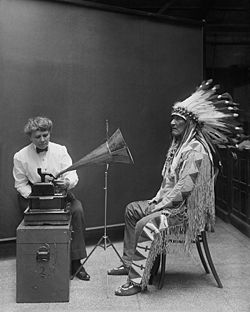- Ethnomusicology
-
This article is about the area of study. For the society and academic journal, see Society for Ethnomusicology.
 Ethnomusicologist Frances Densmore recording Blackfoot chief Mountain Chief for the Bureau of American Ethnology (1916)
Ethnomusicologist Frances Densmore recording Blackfoot chief Mountain Chief for the Bureau of American Ethnology (1916)
Ethnomusicology is defined as "the study of social and cultural aspects of music and dance in local and global contexts."[1]
Coined by the musician Jaap Kunst from the Greek words ἔθνος ethnos (nation) and μουσική mousike (music), it is often considered the anthropology or ethnography of music. Jeff Todd Titon has called it the study of "people making music."[2] Although it is often thought of as a study of non-Western musics, ethnomusicology also includes the study of Western music from an anthropological or sociological perspective. Bruno Nettl (1983) believes it is a product of Western thinking, proclaiming "ethnomusicology as western culture knows it is actually a western phenomenon."[3] Nettl believes that there are limits to the extraction of meaning from a culture's music because of a Western observer's perceptual distance from the culture; however, the growing prevalence of scholars who study their own musical traditions, and an increasing range of different theoretical frameworks and research methodologies has done much to address criticisms such as Nettl's.
Contents
History
While musicology's traditional subject has been the history and literature of Western art music, ethnomusicologists study all music as a human social and cultural phenomenon. The primary precursor to ethnomusicology, comparative musicology, emerged in the late 19th century and early 20th century through the practice of people such as Béla Bartók, Zoltán Kodály, Alan Lomax, Constantin Brǎiloiu, Vinko Zganec, Franjo Ksaver, Carl Stumpf, Erich von Hornbostel, Curt Sachs, Hugh Tracey, and Alexander J. Ellis.[4] Comparative musicology and early ethnomusicology tended to focus on non-Western music that was transmitted through oral traditions. But, in more recent years, the field has expanded to embrace all musical styles from all parts of the world.
The International Council for Traditional Music (founded 1947) and the Society for Ethnomusicology (founded 1958) are the primary international academic organizations for the discipline of ethnomusicology.
Theories and methods
Ethnomusicologists often apply theories and methods from cultural anthropology, cultural studies and sociology as well as other disciplines in the social sciences and humanities. Though some ethnomusicologists primarily conduct historical studies, the majority are involved in long-term participant observation. Therefore, ethnomusicological work can be characterized as featuring a substantial, intensive ethnographic component.
Some ethnomusicological works are created not necessarily by 'ethnomusicologists' proper, but instead by anthropologists examining music as an aspect of a culture. A well-known example of such work is Colin Turnbull's study of the Mbuti pygmies. Another is Jaime de Angulo, a linguist who intensively studied the music of the natives of Northern California.[5] Additionally, Anthony Seeger, Distinguished Professor of Ethnomusicology and the Director of the Ethnomusicology Archive at the University of California, Los Angeles, studied the music and society of the Suya people in Mato Grosso, Brazil.[6]
Academic programs
Main article: List of universities with ethnomusicology programmesMany universities in North America and Europe offer ethnomusicology classes and act as centers for ethnomusicological research. The linked list includes graduate and undergraduate degree-granting programs.[7]
See also
- World music
- Musicology
- Sociomusicology
- Ethnochoreology
- Bruno Nettl
- Smithsonian Folkways
- Fumio Koizumi Prize for ethnomusicology
References
- ^ Pegg, Carole: 'Ethnomusicology', Grove Music Online ed. L. Macy (Accessed February 3, 2008), <http://www.grovemusic.com>
- ^ Titon, Jeff Todd: Worlds of Music, 2nd ed. New York: Schirmer Books, 1992, p. xxi.
- ^ Bruno Nettl 1983:25 - The Study of Ethnomusicology. Urbana, Chicago, and London: University of Illinois Press.
- ^ Ellis, Alexander: On the Musical Scales of Various Nations HTML transcription of the 1885 article in the Journal of the Society of Arts (Accessed September 2008)
- ^ Jaime de Angulo
- ^ Anthony Seeger, Professor, Ethnomusicology UCLA
- ^ SEM: Guide to Programs
External links
- Outreach Ethnomusicology Ethnomusicology Fieldwork Research Resource
- SIL publications on Ethnomusicology listed by country
- Yale Music Library Research Guide for Ethnomusicology
- ILAM International Library of African Music
- Links: Ethnomusicology, Folk Music, and World Music (University of Washington)
- University of Washington Digital Collections – Ethnomusicology Musical Instrument Collection Images of musical instruments from around the world.
- Discovering the Music of Africa
- The World and Traditional Music Section at the British Library Sound Archive
- [1]
Music History of music Prehistoric · Ancient · Biblical · Medieval · Renaissance · Baroque · Classical period · Romantic · 20th century · Contemporary · 21st century
Composition Education and careers Production Cultural and regional genres of music African (Central African · East African · North African · Southern African · West African) · Asian (Central Asian · East Asian · Middle Eastern · South Asian · Southeast Asian) · European (Central European · Eastern European · Northern European · Southeastern European · Southern European · Western European) · Latin American (Central American · South American) · North American (Canadian · Caribbean · United States) · Oceanian (Australian · Melanesian · Micronesian · New Zealand · Polynesian)Lists Index · Glossary of jazz and popular musical terms · Glossary of musical terminology · Outline · Musical forms by era · Instruments · AudioRelated topics Category · Portal · WikiProject Categories:
Wikimedia Foundation. 2010.
